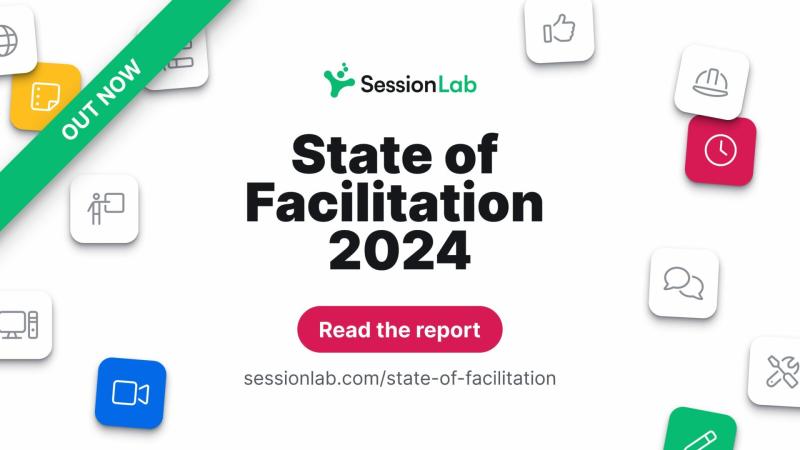Insights from a 2025 Facilitation Report
SessionLab released their 2025 “State of Facilitation” report.
Below are the top take-aways from the report as shared by SessionLab. Be sure to download the actual report to dive deeper.
Human-led, tech-enhanced
Facilitation in 2025 is all about finding the balance between the human and technological aspects of the craft. Facilitators must know how to stay in the moment, present and aware of human dynamics. At the same time, increased use of specialized software and AI assistance indicates the growing importance of technological proficiency, with facilitators who embrace these tools gaining a competitive edge. Technology can enhance facilitation, but how to keep it from being a distraction?
Multi-modal facilitation
The silos between online vs in person facilitation have broken down. With more teams and projects happening in distributed locations, facilitators are called in to help teams keep aligned, wherever they are. Facilitation has become multi-modal, operating across hybrid formats, combining in-person, online, and asynchronous sessions. Hybrid facilitation in particular requires extra expertise and resources for maintaining engagement across diverse participant groups.
Bite-sized sessions
The length of a typical session has shortened since pre-Covid days, from half a day to 90 minutes. Facilitators must adapt to shortened attention spans, deliver impact quickly, and get creative with working in modules or series of sessions. It can be challenging to identify what can be done in small interventions and what truly requires more space and time.
L&D is where it’s at
Facilitation skills are spreading within companies, with more professionals working in-house. Larger organizations in particular are discovering the benefits of having team leaders and managers put facilitation skills at work in regular meetings and collaborative projects. Learning and development departments are leading the way in promoting facilitation as an essential leadership skill.
It’s time to build capacity
As facilitation gains recognition as a workplace skill, the need for training in general facilitation skills is rising. Interest is growing for introductory courses sharing facilitation basics that can make the difference in any meeting or event. This represents an opportunity for facilitators to lead by example and upskill other professionals.
The responsible facilitator
Facilitators are often the ones calling attention to cultural sensitivity and matters of diversity, equity and inclusion (DEI). When asked for their vision for the coming years, facilitators wrote about the importance of managing cultural dynamics with sensitivity, and ensuring all voices are heard, regardless of format. In the midst of a backlash against DEI, what does it take to be a responsible facilitator?
Insights from the 2024 Facilitation Report
You can also view the 2024 “State of Facilitation” report. It’s a great report to review. 975 facilitators contributed to this research!
Check out the whole report – here’s what it discusses:
How is facilitation changing?
The path to professional facilitation in 2024 requires becoming literate in the use of digital tools while cultivating the heart of the craft: relationships, trust, and human connection.
How are digital tools and AI impacting how facilitators work inside and outside of a session?
How is facilitation helping companies to navigate the new world of work?
Click the link to read the report yourself to see what facilitation was like in 2023 and what that can teach us about the promises and challenges of 2024.
Facilitator Training
The “State of Facilitation 2024” report by SessionLab provides an insightful overview of the facilitation field. The most interesting finding to me was the lack of formal training for facilitators. Facilitator survey respondents were asked the question “what accreditation or training certificates did you acquire related to facilitation?” 84.6% listed none. As the report shared, “it is sobering to see such high percentages of people who do not have any accreditation or training certificates related to facilitation in their background. “None” is the most common answer by far.”
How did you learn to facilitate? Pick up to three pathways that had the most impact on your facilitation development. For this response, the facilitators are learning facilitation just by doing it or observing another facilitator leading a workshop or event. Very few have participated in a formal facilitator training program.
Design Thinking and Brainstorming Facilitation
I also took note of the responses to this question: Which methodologies / techniques / frameworks have you used in your sessions over the past 12 months? Brainstorming was #1 with 74.6% in 2023…up from 2.5% in 2022. Also, design thinking was #3 at 48.4%, up from 12.9% in 2022. These are quite the gains for our core interest…facilitating design thinking and brainstorming!
Other key findings from the report include the varied backgrounds and experiences of facilitators, the diverse methods and tools they use, and the challenges they face, particularly regarding training and professional development. The report also highlights the impact of digital transformation on facilitation practices and the importance of adapting to new technologies and methodologies.
